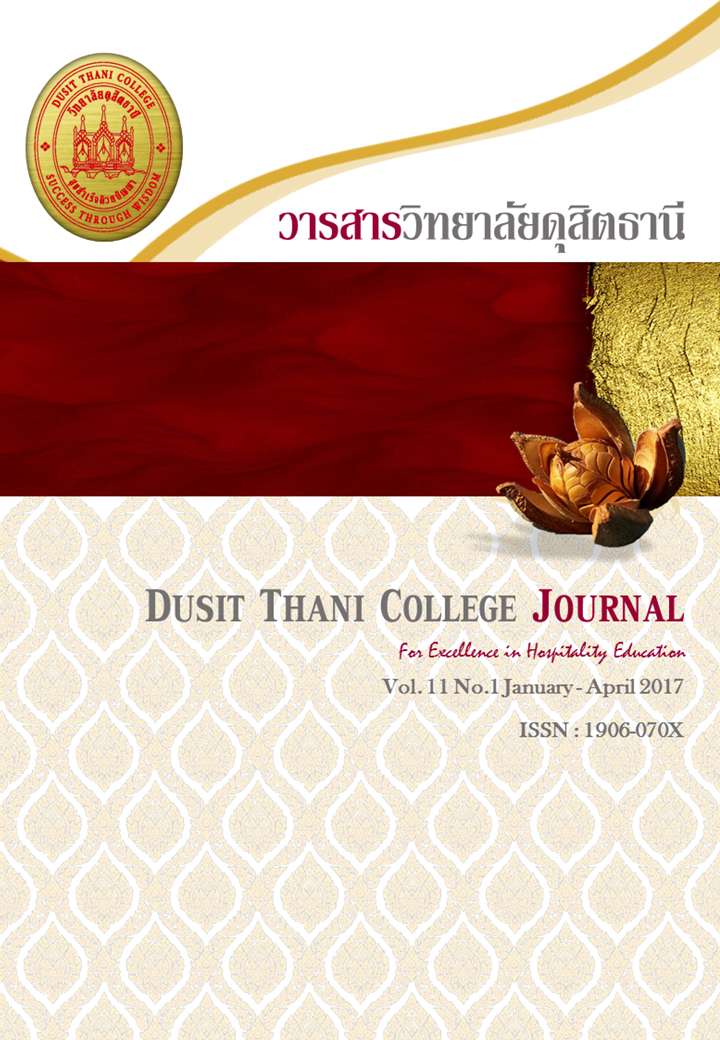The Study of The Impacts of Outbound Tour Operator Business from The Changing of Students in Higher Education’s Second Semester Holiday
Main Article Content
Abstract
The study had 3 main purposes including 1. to study the impact of the adjustment of semester holiday according to the AEC on the number of Thai tourists using the services of Thai outbound tour operators 2. to study the impact of the adjustment of semester holiday according to the AEC on the income of Thai outbound tour operators 3. to study the impact of the adjustment of semester holiday according to the AEC on the arrangement of tour program of Thai outbound tour operators.
The population in the study was separated into 3 groups; the first group; the sample population were 400 Thai tourists who purchased tour program from outbound tour operator; the study tools were questionnaire and analytical statistic consisted of frequency distribution, average, percentage, standard deviation, the researcher also tested the hypothesis by using (SPSS) One sample t-test. The second group, the sample population were 102 managers of outbound tour operators; the study tools were questionnaire and the other tools same as the first group. And the third group, 5 persons from TTAA including president of TTAA, former president of TTAA and the advisors of TTAA; the study tools were interview method.
The results of the findings were:
- Thai outbound tourists commented that it would cause the number of Thai outbound tourists to reduce at high level ( = 4.05). However, the outbound tour operators’ opinion was that the impact on the reduction of a number of tourists will be at medium level ( = 2.61). The result of the interview showed that there would be the impact at the first period, however there won’t be any problems in the long term.
- Thai outbound tourists’ opinion was that the impact on the income of outbound tour operators would be at highest level ( = 4.40) due to the fact that Thai tourists prefer traveling abroad during a long holiday period, starting from March to May, especially during the Songkran festival’s holiday. However, the outbound tour operators’ opinion was that since outbound tour operators can adapt their businesses to the marketing circumstance, the impact would be at low level ( = 2.54). As for the interview, the result showed that there won’t be any impact on the income at all.
- Thai outbound tourists’ opinion was that it would cause tour program to change at medium level ( = 3.08). However, the outbound tour operators’ opinion was that the impact would be at low level ( = 2.53). It could be inferred from the result of the interview that some tour itineraries will be changed to meet the need of tourists in both period of travel and reasonable price.
Article Details
Article Screening Policy
- All research and academic articles to be published must be considered and screened by three peer reviews in the relevant field / article.
- All articles, texts, illustrations and tables published in the journal are the personal opinions of the authors. Editors don't always have to agree. And no responsibility whatsoever is the sole responsibility of the author.
- The articles to be published must never be published. Where did you first publish? And not in the consideration of other journals If the audit found that there has been a duplicate publication It is the sole responsibility of the author.
- Any article that the reader sees as being plagiarized or impersonated without reference. Or mislead the work of the author Please let the journal editor know it will be your greatest blessing.
References
Chittangwattana, B., (2006). Tourism Business. Bangkok: Press and Design.
Heng Kao. (2009). Guide Lines to Develop Marketing for Thai Tourists to Choose to Travel to Kunming. Master Independent Study in Bachelor of Arts (Tourism), Graduate School, Rangsit University.
Juthaporn, S., (2013). Introduction to Tourism Industry Unit1-7. 2nd Ed. Teaching Literature. Bangkok: Sukhothai thammathirat University.
Kittikul, T. (1997). Factors Related to Decision Making to Travel Aboard of Thai People Case Study: Thai People Who are going to Foreign Countries Through Chiang Mai International Airport. Master Thesis in Business Administration, Graduate School, Mae Jo University.
Mason, Peter. (2008). Tourism impacts, Planning and Management. Oxford: Butterworth-Heinemann.
McIntosh, Robert W. and Goedner, Charles R. (1991). Tourism Principle, Practices, Philosophies, 5th ed. New York: John Wiley and Sons, Inc.
Patton, M.Q. (1990). Qualitative Evaluation and Research Methods. 2nd Edition. Newbury Park, CA. Sage Publication, Inc.
Samithikrai, C., (2011). Consumer Behavior. 2nd Ed. Bangkok: Chula Press.
Sereerat, S. (2007). Consumer Behavior. Bangkok: Theera Film and Sotext Co.,Ltd.
Tourism Authority of Thailand. (2003). Executive Summary Practical Plan to Develop Tourism Service . Bangkok: Tourism Authority of Thailand.
Wongmontha, S., (1999). Consumer Behavior. Bangkok: Theera Film and Sotext Co., Ltd.
Yamane, Taro. (1973). Statistics: An Introductory Analysis. 3rd ed. New York: Harper & Row Publisher Inc.
Department of Tourism. (August 23, 2014). Tourism Expenditure by Outgoing Thai Travellers. Retrieved from http:// www.tourism.go.th
Department of Tourism. (August 23, 2014). Internal Tourism. Retrieved from http:// www.tourism.go.th
Thongbu, S. (August 23, 2014). The Impact of Higher Education Semester Changed toward AEC 2015. Retrieved from http://oknationtv.tv/ blog/ paksa/ 2013/ 10/06 entry-1


